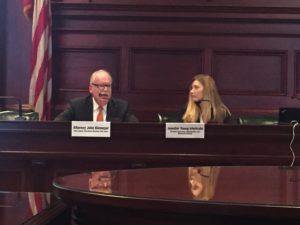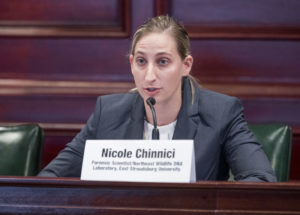HARRISBURG – A joint Senate committee hearing took a closer look on Tuesday at ongoing state efforts to prevent, diagnose and treat tick-borne illnesses, including Lyme disease.
“The trend lines on Lyme disease and tick borne illnesses are causing concern in a lot of places,” said Sen. Lisa Baker, R-20th, who chairs the Health and Human Services Committee. “Local officials and community leaders have done far more than lament the problem. It is time the state shows the same sense of urgency.”
Joined by the Aging and Youth Committee, legislators heard testimony from the Acting Secretary of Health, physicians, university professors, members of various tick task forces and Lyme disease associations, and others. A number of those testifying shared their personal experiences as individuals treated for, or living with, tick-borne illnesses.
Sen. Baker noted that, “Various groups have spent a great deal of time studying this issue, a fair amount of research has been conducted, and numerous well-considered recommendations for public action have emerged. Despite this activity, the impression among officials and citizens alike is that Pennsylvania is lagging in coordinated and effective action.”
She said that Lyme disease isn’t a partisan issue and those afflicted with the illness deserve to know that their government is doing all it can to address the matter.
“Because of the susceptibility of kids, because of the potential of severity if undiagnosed, because of the lifelong debilities that can result, it is indefensible to offer standard excuses about not enough money to do much or too few individuals requiring aggressive treatment. The purpose of this hearing is to find out what directed actions are being taken on the part of state government to implement recommendations, and to find out what notable gaps in response exist,” Baker added.
Jennifer Intelicato-Young, a lecturer with Penn State’s Department of Biochemistry and Molecular Biology, noted that there are 300,000 new cases of Lyme disease reported each year in the United States.
Speaking from experience, the Dorrance Township resident noted that “While the majority of cases can be cured with a 28-day regimen of doxycycline, if treated early, a prominence of misdiagnosis and unreliable testing can oftentimes lead to a far more devastating and difficult disease to treat.”
“Unfortunately, I was one of the patients that initially tested negative for the disease that ultimately left me bedridden for the better part of two years,” Intelicato-Young said.
John Klemeyer, a Milford attorney who serves on the Pike County Tick Borne Disease Task Force, and has been inflicted with a tick-borne illness himself, told the senators that “The State Task Force Report suggests and recommends the development and implementation of an initial and ongoing education program for healthcare providers. It is our view that a comprehensive program should be mandatory for emergency room physicians, infectious disease physicians, internists, general practitioners and pediatricians.”
“Pediatricians,” Klemeyer said, “are very important since it appears that the incidence of infections in young children is significantly higher than that in the general population.”
Nicole Chinnici, director of East Stroudsburg University’s Northeast Wildlife DNA Laboratory, the largest tick testing research facility in Pennsylvania, agreed that a well-informed physician is one of the best defenses.
“Education and awareness have been shown to be effective in slowing and reducing the number of Lyme disease cases. Patients rely heavily on the expertise of their medical providers and physicians for accurate diagnosis and treatment of illnesses. The list of TBDs (tick borne diseases) is expanding rapidly … .” Chinnici said. “Implementing physician education and continuing education requirements on tick borne diseases will assist medical providers in identifying symptoms, diagnosing, treating and reporting TBDs.”
In 2014, the legislature created a task force — made up of community members, researchers, and clinicians, among others — to investigate ways to educate the public about Lyme disease and establish a statewide tick surveillance program. That panel issued multiple recommendations. Senators are trying to determine how many of those recommendations have been accomplished, the current extent of the problem across the state, and what steps need to be taken to address it moving forward.
To view testimony and information, go to: https://health.pasenategop.com/102417/
Andrew M. Seder
District Communications/Constituent Services for Pike and Wayne Counties
Office of Senator Lisa Baker
2512 Route 6
Hawley, PA 18428
(570) 226-5960
aseder@pasen.gov
www.senatorbaker.com




